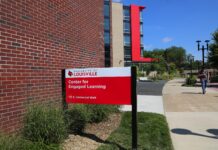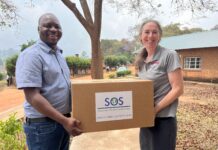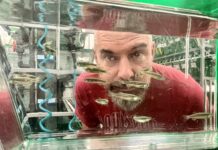
It is certainly no secret that the COVID-19 pandemic has turned our world upside-down. This is perhaps especially true when it comes to the field of education. As students have transitioned to primarily online modes of learning, university campuses across the country have seen massive shifts in living, learning and providing instruction.
In UofL’s College of Education and Human Development, many faculty members have also contended with another pandemic dilemma – ensuring that students are involved in practicum experiences and maintaining the quality of those experiences during such uncertain times.
As the director of the Cardinal Success Program, and professor in the Department of Counseling and Human Development, Patrick Pössel coordinates and facilitates the placement of master’s students in counseling psychology settings within the West Louisville community. The program housed within two brick-and-mortar locations (the Academy at Shawnee and the Nia Center), have developed a consortium model in the years since its creation. With additional support from postdoctoral associate Brooke Rappaport, the program partners with several community organizations, including the Norton Children’s Autism Center and the University of Louisville Trager Institute.
Regardless of the location, students enrolled in counseling psychology, clinical mental health counseling, art therapy, or mental health nursing programs are given the opportunity to gain face-to-face experience with clients in a therapeutic setting. All CSP clients are uninsured or under-insured, and all of the services are offered at no cost to clients.
As the COVID-19 pandemic hit and in-person counseling services were rendered impossible, Pössel was faced with the task of moving the CSP operation and practicum experiences to a telehealth format. While the program was shuttered for March and April 2020 while the logistical details were finalized, the practicum students were beginning to reach out to their clients to offer telehealth services in early May.
“I know that it was a huge relief, both to me and to my clients, when we were able to start making those phone calls and letting folks know that we could begin sessions again,” said counseling psychology graduate Emily Edwards. “There was a pretty huge learning curve with the switch to telehealth, but knowing that I would get to start seeing my clients again made it all worth it.”
Both in-person and telehealth services have their drawbacks and advantages, Pössel said.
“I think that this has made it easier for some clients to receive our services. Now, you don’t have to travel to us. If you need childcare services, you only need those services for an hour as opposed to an entire afternoon,” he said. “We once had a client receiving our services who walked two hours each way to get to and from his sessions. That is a five-hour trip once per week. Now, all he needs to do is login to attend his sessions.”
However, Pössel adds there are certain risks that go along with students conducting sessions from their homes.
“It is really tricky to have a student providing services from home, and just trusting that that student will call you if anything goes wrong. When we offer in-person services, our students know that I am only two rooms away and all it takes is coming over to ask for help,” he said.
Current counseling psychology student Allie Christian noted her positive experience in offering telehealth services.
“I believe that telehealth allows for clients to be a little bit more flexible with their schedules since they do not have to worry about the time it takes to get to either of [our] sites,” she said. “Being able to have therapy sessions at home also allows clients to be in a more comfortable and familiar environment.”
However, Christian also noted challenges with her clients, including those who may struggle with the technology needed to facilitate telehealth and disparities in WiFi access.
Pössel says that the program has done its best to respond to such challenges in order to offer equitable services to all. The Jewish Heritage Fund for Excellence provided the program with a generous donation so it could purchase 15 Chromebooks for youth clients, for example.
The shift to telehealth has also changed the scope of the work CSP is able to do throughout the state of Kentucky.
“While our focus is still in West Louisville, we are now only limited by the state borders, not travel time,” Pössel said.
For example, the program is now receiving referrals from Bullitt County through Norton Children’s Hospital.
While the future remains uncertain, Pössel looks forward to reopening the doors to CSP in-person.
“As soon as possible, we will provide both in-person and remote services again. The idea is not that this is simply an emergency situation that we will drop when we are able to. Our goal is always to meet people where they are,” he said.
Story written by Natalie Hewlett, coordinator for development and communications in the College of Education and Human Development.

































